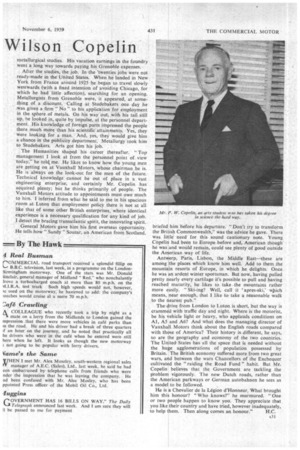Wilson Copelin
Page 33

If you've noticed an error in this article please click here to report it so we can fix it.
metallurgical studies. His vacation earnings in the foundry went a long way towards paying his Grenoble expenses.
After the studies, the job. In the 'twenties jobs were not ready-made in the United States. When he landed in New York from France around 1925 he began to travel slowly westwards (with a fixed intention of avoiding Chicago, for which he had little affection), searching for an opening. Metallurgists from Grenoble were, it appeared, at something of a discount. Calling at Studebakers one day he ,was given a firm " No " to his application for employment in the sphere of metals. On his way out, with his tail still up, he looked in, quite by impulse, at the personnel department. His knowledge of foreign parts impressed the people there much more than his scientific" attainments. Yes, they were looking for a man. And, yes, they would give him a chance in the publicity department. Metallurgy took him to Studebakers. Arts got him his job.
The Humanities shaped his career thereafter. "Top management I look at from the personnel point of. view today," 'he 'told me. He likes to know how the young men are getting on at Vauxhall Motors, whose chairman he is. He is always on the look-out for the men of the future. Technical knowledge cannot be out of place in a vast engineering enterprise, and certainly Mr. Copelin has acquired plenty; but he thinks primarily of people. The Vauxhall Motors attitude to appointments must owe much to him. I inferred from what he said to me in his spacious room at Luton that employment policy ,there is not at all like that of some other British enterprises, where identical experience is a necessary qualification for any kind of job. I detect the bracing transatlantic spirit, the innovating spirit.
General Motor's gave him his first overseas opportitnity. He tells how " Sandy " Soutar, an American from Scotland, briefed him before his departure. "Don't try to transform the British Commonwealth," was the advice he gave. There was little' need for this sound cautionary note. Young Copelin had been to Europe before and, American though he was and would remain, could see plenty of good outside the American way of life.
Antwerp, Paris, Lisbon, the Middle East—these are among the places which know him well. Add to them the mountain resorts of Europe, in which he delights. Once he was an ardent winter sportsman. But now, having pulled pretty nearly every cartilage it's possible to pull and having reached maturity, he likes to take the mountains rather more easily. " Ski-ing? Well, call it apres-ski,' witich means, near enough, that I like to take a reasonable walk to the nearest pub."
The drive from London to Luton is short, but the way is crammed with traffic day and night. Where is the motorist, be his vehicle light or heavy, who applauds conditions on Al, A5 and A6? And what does the managing director of Vauxhall Motors think about the English roads compared with those of America? Their history is different, he says, so are the geography and economy of the two countries. The United States has all the space that is needed without the huge agglomerations of population possessed by Britain. The British economy suffered more from two great wars, and between the wars Chancellors of the Exchequer cultivated the "raiding the Road Fund" habit. But Mr. Copelin believes that the Government are tackling the problem vigorously. The new Dutch roads, rather than the American parkways or German autobahnen he sees as a model to be followed.
He is a Chevalier de la Legion d'Honneur. What brought him this honour? "Who knows?" he murmured. "One or two people happen to know you. They appreciate that you like their country and have tried, however inadequately, to help them. Then along comes an honour." H.C.












































































































